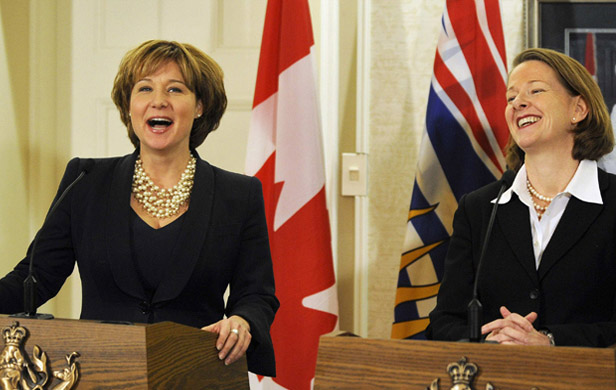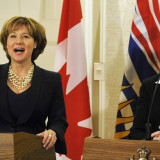
VICTORIA – British Columbia Premier Christy Clark and Alberta’s Alison Redford have appointed a team of senior bureaucrats to develop an energy export plan, barely a year after a high-profile disagreement over the proposed Northern Gateway pipeline strained the two leaders’ relationship.
Clark and Redford are scheduled to publicly discuss the progress of the joint energy plan on Nov. 5 in Vancouver following the Alberta premier’s address to the city’s Board of Trade. A final report is due on Dec. 31.
Enbridge clash
The premiers are attempting to move past their very public clash over the Northern Gateway pipeline, which was the subject of a meeting in Calgary last October that Clark later described as “frosty.”
Clark had insisted the project must meet a series of conditions, including strict environmental standards and assurances that B.C. would receive a “fair share” the economic benefits, to win her approval, which prompted Redford to suggest Clark was attempting to pick Alberta’s pockets with demands for extra royalties.
“Frosty” relationship warming?
But a joint statement issued Tuesday was the latest sign that relations between the two premiers are warming. This past June, Clark and Redford met in Kelowna, B.C., and while they didn’t mention the Northern Gateway project, they announced the creation of a working group to focus on skills training, immigration and economic growth.
“In creating the working group, B.C. and Alberta identified the shared goals: opening new markets and expanding export opportunities for oil, gas and other resources,” and, “creating jobs and strengthening the economy of each province and Canada through the development of the oil and gas sector,” said Tuesday’s joint statement.
Clark and Redford both declined interview requests on Tuesday.
Alberta-B.C. working group
The Alberta-B.C. working group, jointly chaired by deputy ministers from both provinces, has been given a mandate to share information, collaborate on policy and address federal gaps on energy issues.
The terms of reference include five policy areas that mirror Clark’s five conditions.
The group has been directed to consult with First Nations; explore other resource transportation options, including rail; look at how to promote resources; and study ways to reduce the potential impact of oil spills. It is also to examine how to make sure both provinces receive a fair share of resource revenues.
“It is not about royalty sharing, but rather about receiving a fair share of the economic and fiscal benefits of a proposed heavy oil project that reflects the levels, degree and nature of the risk borne by B.C., the environment and taxpayers,” said the premiers’ statement.
[quote]Given the risk to B.C. from land-based and coastal bitumen spills, B.C. does not believe an equitable distribution exists for fiscal benefits. This imbalance must be addressed.[/quote]
First Nations remain opposed to Enbridge
Coastal First Nations spokesman Art Sterritt said northern B.C.’s aboriginals are opposed to seeing a pipeline built along their traditional territories and believe the risk of an oil tanker spill is too great to even contemplate. The Coastal First Nations group, which represents most coastal aboriginal nations from Rivers Inlet in southern B.C. to the Alaska border in the northwest, has been a staunch opponent of the pipeline.
Sterritt said his group intends to hold Clark’s Liberals to the government’s previous statements that the Northern Gateway pipeline, as it is currently proposed, fails to adequately address the potential environmental risks.
“They don’t have the technology,” Sterritt said from Terrace, B.C.
“The geography is not very friendly and there isn’t anybody in the north that wants the project. I don’t know how they are going to make it work.”
Sterritt said the possibility of transporting Alberta oil to the B.C. coast by rail, an option that will be considered by the working group, “boggles the mind.”
He warned that much of B.C.’s rain infrastructure runs over mountains and along rivers, meaning it wouldn’t change the potential risk of a spill.
Dix: Clark watering down “5 conditions”
The leader of B.C.’s Opposition New Democrats, Adrian Dix, said it appears the joint working group’s terms of reference are a watering down of Clark’s original five conditions.
Dix said the working group’s mandate appears more focused on ensuring energy projects like pipelines proceed as opposed to ensuring environmental safety and meaningful consultations with First Nations.
“It’s apparent on the B.C. side where their priorities are,” he said.
[signoff1]


These two are thinking and acting like childish schoolgirls. They are beyond irresponsible and have no right to be in the position power they are in…it’s disgusting and disgraceful.
Furthermore:
Besides learning about ‘democracy’ and the fact that it is the best political system for defending human rights, I learned about some alternative regime types that do not allow such freedoms: in particular ‘authoritarianism’ and ‘kleptocracy’.
The saddest and scariest part is: the latter leadership styles describe to a ‘T’ the political direction that Stephen Harper, Christy Clark and Gordon Campbell have taken us. The picture becomes very clear when you do a side-by-side comparison of these regime types and let me say very loudly, “WE NO LONGER HAVE A DEMOCRATIC SYSTEM IN CANADA!” Even in its simplest form of ‘electoral democracy’ we have electoral fraud.
These so-called ‘leaders’ have no respect for the rules of democracy and all score a disgraceful 0 out of 10 points in Political Legitimacy, which includes the aspects of shared wealth, accountability, stability, transparency, and freedom. Legitimacy directly affects democracy and any legitimacy they did have is what was there when they came into their position of power – and they have bankrupted that bank account, too.
The bigger picture for Canadians:
We are in what is known as a ‘Democratic Recession’ and the strongest resources we have to counteract this downward spiral is our constitution and the voice of the people. It is apparent and imperative that the citizens of Canada regain control of their government officials, because we deserve better than how they are currently treating us. It will require more people to take up the sword and shield to protect and defend our endangered democratic system and bolster it back from its near-death experience and into its full glory.
What we need is more people to know in their hearts and minds what HIGH-QUALITY DEMOCRACY actually looks like and the fact that it’s real, attainable, and it’s where we should be on the political scale. Then, the ideas for creating such a society will spew forth unbounded in the face of fascist fundamentalism to make it so – for now and the future.
Just like TILMA dictates the success of oil and gas pipelines across the BC Alberta Border, it also dictates the establishment of the “Working Group” negotiating terms discussed here, all of which fall under the auspices of TILMA NWPA.
Odd that MSM never mentions the TILMA NWPA given that it dictates everything these two are doing and has since its inception on these issues.
Indeed, Kevin. Some of your earlier posts on the subject are referring to our readers here:
https://commonsensecanadian.ca/VIDEO-detail/the-truth-about-christy-clarks-position-on-pipelines-tankers/
https://commonsensecanadian.ca/myth-of-bc-liberal-neutrality-enbridge-christy-clark/
https://commonsensecanadian.ca/christy-clark-tough-new-stand-enbridge-meaningless-epicly-duplicitous-david-emerson/